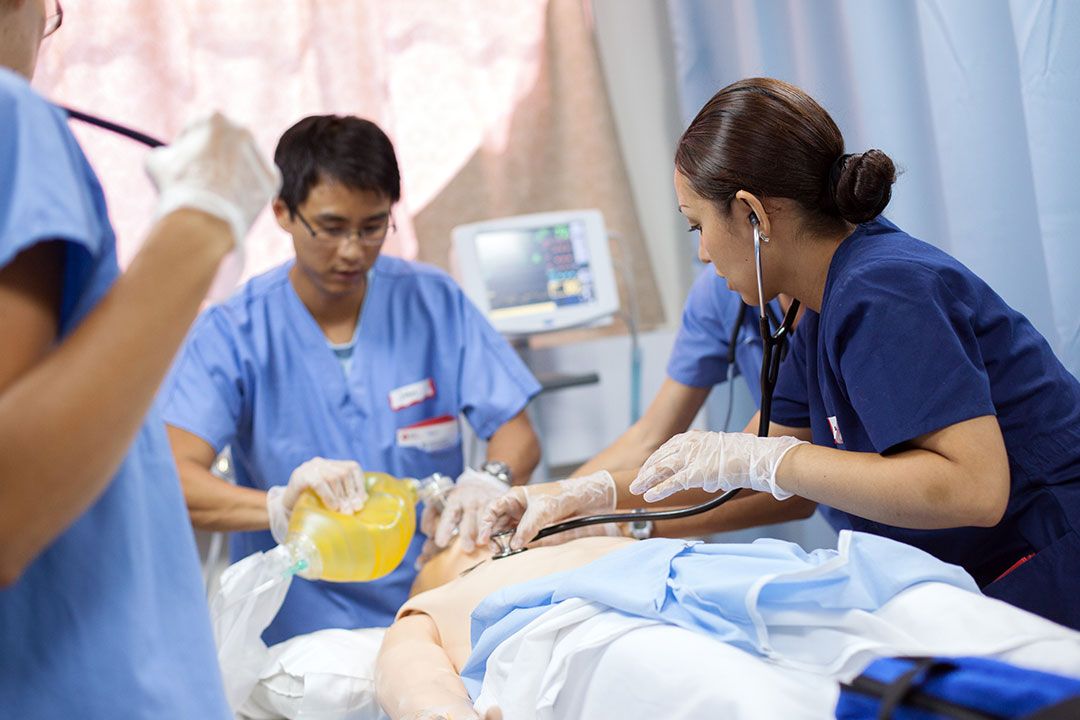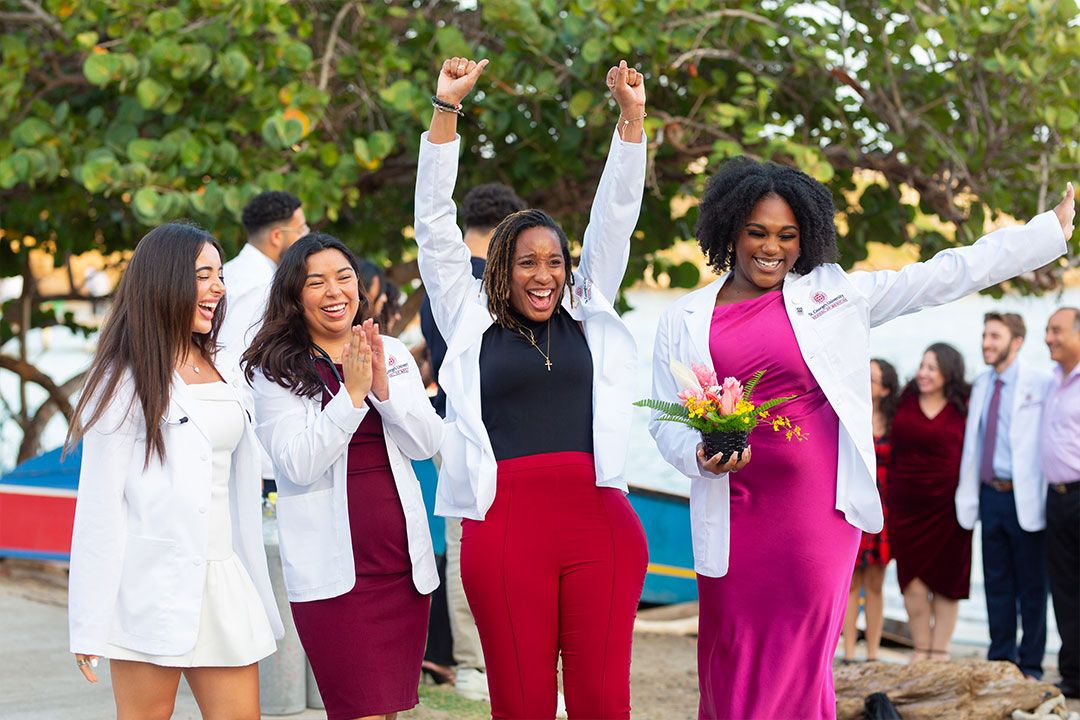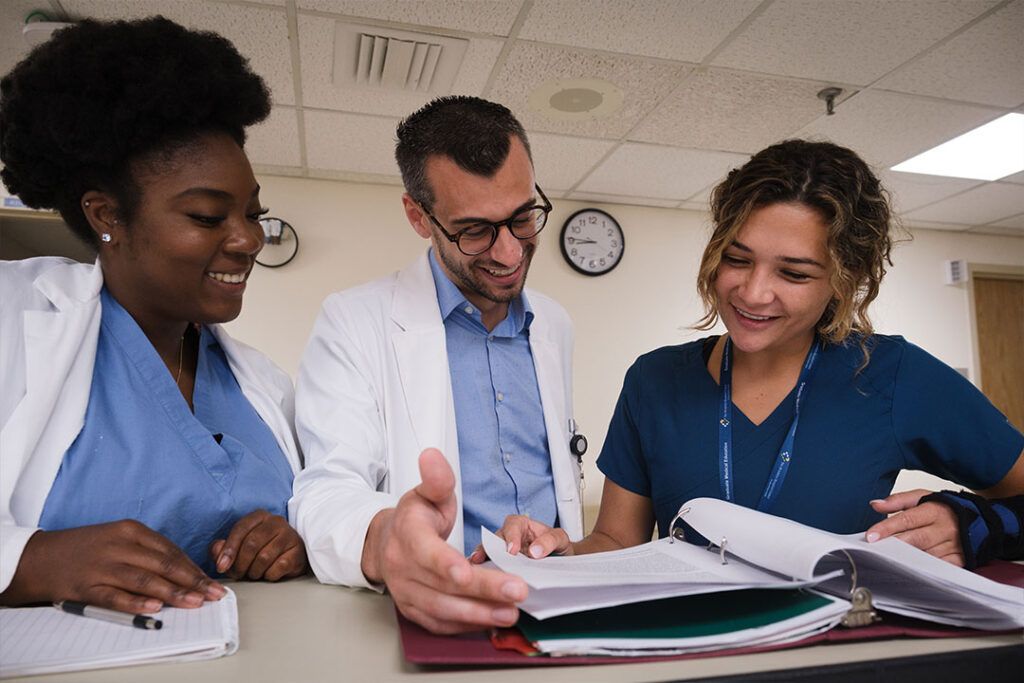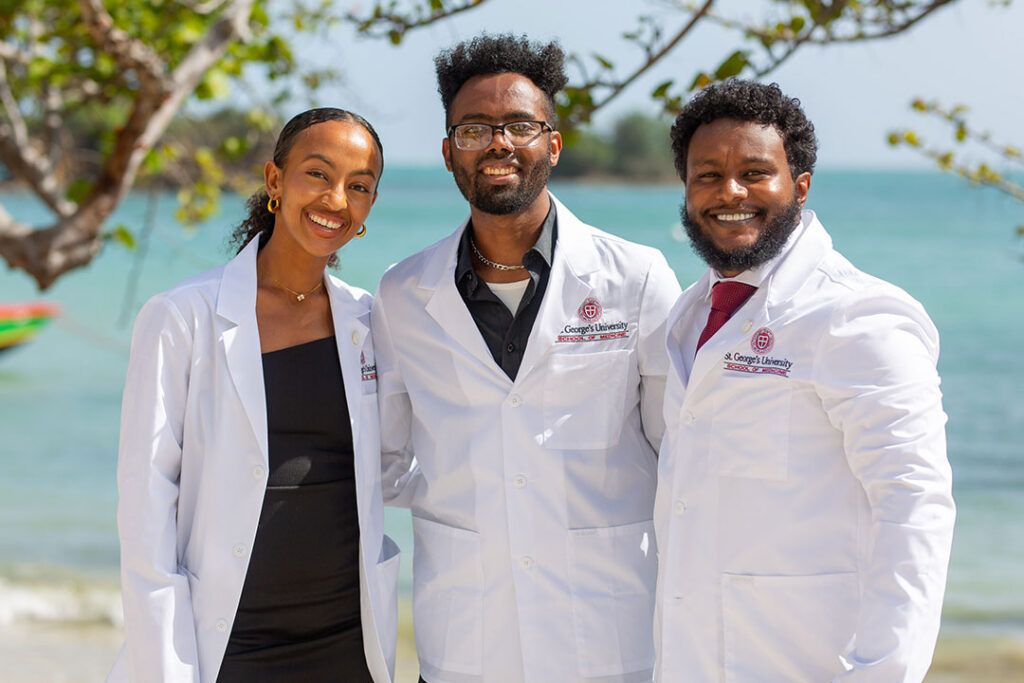Admissions
Where you choose to go to medical school can make a difference.

Why Choose St. George’s University For Your Medical Training?
With over 45 years’ experience in training physicians, SGU is proud of the impact we have made on medical care in the United States, Canada, and around the world. St. George’s University is the largest source of doctors for the entire US.1
1) According to FSMB physician licensure data, 2023.
A Strong
Foundation
SGU’s systems-based curriculum provides a strong foundation in the basic sciences with the opportunity for relevant, hands-on learning that is supported by modern medical and academic technologies, such as virtual reality and sonography.
Personalized
Support
SGU is committed to the ongoing support of every student during their medical education. SGU offers personalized learning strategies, access to caring faculty and professional advisors, and regular opportunities for small group learning that can help promote success in medical school and beyond.
Expert
Career Guidance
Our Office of Career Guidance (OCG) provides expert guidance and ample resources starting with the basic science and clinical years, right through to pursuing residency and postgraduate opportunities. OCG offers you strategies to help you identify the best postgraduate specialties and residency programs to meet your professional goals and provides personalized and dedicated guidance throughout the application and interview process.
A Network of Peers
Around the World
As an SGU graduate you will join and have access to an accomplished alumni network of more than 25K graduates around the world.
Criteria For Student Selection
Our committee on admission, the Faculty Student Selection Committee, is responsible for the selection of students to St. George’s University School of Medicine.
Applicants to the School of Medicine are selected individually for admission by considering each applicant’s academic strengths as well as their experiences and attributes. These factors are viewed in combination to consider how an individual might contribute value not only as a medical student but also as a future physician.
Medical School MD Program Requirements
4-Year MD Program Requirements for US and Canadian Applicants
Degree
A bachelor’s degree from an accredited college or university is required.
Prerequisite Coursework
The following specific undergraduate coursework (or its equivalent*) is required as part of the program requirements for admission:
- One year General Biology or Zoology with lab
- One year Inorganic Chemistry (General or Physical) with lab
- One year Organic Chemistry with lab
- One semester Physics with lab
- One semester of a 100‑level college or university-level mathematics course
- One semester English
*For information related to prerequisite equivalencies, please speak with your assigned Admissions Officer or email admissions@sgu.edu.
Medical School Admission Test (MCAT)
SGU’s MCAT code is 21303. For information on the MCAT, including registering to take the test, test dates, test sites, fees and obtaining test results, visit the MCAT website.
Who needs to submit an MCAT score?
- US applicants must submit a Medical School Admissions Test (MCAT) score as part of their application.
- Canadian applicants are not required to submit an MCAT score unless an MCAT exam has been previously taken or you have a date to take the MCAT.
- Applicants from outside North America are not required to submit an MCAT.
4-Year MD Program & Track Requirements for Non-US and Non-Canadian Applicants
Degree
A bachelor’s degree with a strong science background is necessary.
English Proficiency
English language: An English exam is required for any prospective student whose country is not considered English-speaking as per UK Visas and Immigration (UKVI) guidance.1 However, an exception may be granted to students with an undergraduate degree from any English-speaking country—a waiver must be requested from SGU in this instance.
- IELTS: 7.0 overall and 7.0 on each band required for direct entry
- TOEFL: 94-101 overall is required for direct entry (24-26 reading / 24-26 listening / 23 speaking / 27-28 writing)
- Password Skills: Scoring is the same as IELTS scoring for direct entry
- C1 Advanced (CAE): 185 overall and 185 in each band required for direct entry
- PTE Academic: A score of 66.3 overall is required for direct entry (67.6 reading / 66.2 listening / 65.3 speaking / 82.3 writing)
- Duolingo English Test (DET): 130 overall and 130 on each band required for direct entry
- Kaplan Test of English (KTE): 510 overall and 510 on each band required for direct entry
1Visit GOV.UK for the list of approved English-speaking countries: gov.uk/student-visa/knowledge-of-english
| Entry Point | Entry Requirements | Entry Point |
| 4-Year MD Program | Bachelor’s Degree in the requisite sciences. | MD Year 1 |
| 5-Year MD Track |
Advanced Levels: A minimum of 3 subjects with grades A or B in biology, chemistry, and either math or physics. If neither math nor physics was taken at A Levels, a strong third non-science subject may be accepted, provided there is proof that math or physics was taken at AS Level. Approved Foundation Programs: SGU recognizes and approves a range of science/medical pathway programs. Full IB Diploma: Requires a minimum score of 32 points; 3 HL science subjects recommended; minimum of 2 HL subjects required, which must include chemistry and biology; results 5 or higher. All 10 + 2 India Senior Secondary School Certificate: Minimum average of 80% average in biology, chemistry, math, physics, and English. A pre-sessional math program may be necessary if math has not been taken or successfully completed before matriculation. |
Preclinical Year 3 |
| 6-Year MD Track |
Further education: AS Levels, Baccalaureate, South Africa Matric, Higher School Exam, Irish Leaving Certificate. BTEC: Diploma must be in the appropriate sciences with grades of Distinction. Secondary School and American High School Diploma: Overall average of 90% or better with strong science performance. |
Preclinical Year 2 |
| 7-Year MD Track (Grenada only) |
IGCSE: B or better in minimum 6 subjects, which include biology, chemistry, math, physics, and English. Secondary School and American High School Diploma. |
Preclinical Year 1 |
Technical Standards
St. George’s University School of Medicine has established technical standards for admission to, continued enrollment in and graduation from the MD program. You may review the technical standards here.
St. George’s University is committed to and embraces diversity in all forms. Students with disabilities are encouraged to access all campus resources including registering with Student Accessibility and Accommodation Services. Early communication is critical to successfully considering accommodation requests and arranging reasonable accommodations.
Observation Skills
Medical students must be able to participate actively in all demonstrations, clinics and laboratory exercises throughout the MD program, and to assess and comprehend the condition of all patients assigned to them for examination, diagnosis, and treatment.
Communication Skills
Medical students must be able to communicate effectively and sensitively with patients in order to elicit information, describe changes in mood, activity, and posture, assess verbal and non-verbal communications, and be able to effectively and efficiently transmit information to patients, fellow students, faculty, staff, and all members of the health care team. Communication skills include speaking, reading, and writing, as well as the observation skills described above. Applicants/medical students should be able to hear the history of a patient and respond to the patient verbally. They must be able to read and write in standard format and must be able to interact with computers in rendering patient care.
Motor Skills
Medical students must have sufficient motor function to elicit information from patients by palpation, auscultation, percussion, and other diagnostic maneuvers, be able to perform basic laboratory tests, possess all skills necessary to carry out diagnostic procedures, and be able to execute motor movements reasonably required to provide general care and emergency treatment to patients.
Intellectual/Conceptual, Integrative, and Quantitative Abilities
Medical students must be able to measure, calculate, reason, analyze, and synthesize. Problem-solving, the critical skill demanded of physicians, requires all of these intellectual abilities. In addition, applicants/medical students must be able to comprehend three-dimensional relationships and to understand the spatial relationships of structures. Applicants/Medical students must have the capacity to perform these problem-solving skills in a timely fashion. Applicants/medical students must be able to learn effectively through a variety of modalities including the use of computer-based technology.
Behavioral and Social Attributes
Medical students must possess the emotional health required for full utilization of their intellectual abilities, the exercise of good judgment, the prompt completion of all responsibilities attendant to the diagnosis and care of patients, and the development of mature, sensitive, and effective relationships with patients and others. Applicants/ Medical students must also be able to tolerate taxing workloads, function effectively under stress, adapt to changing environments, display flexibility, and learn to function in the face of uncertainties inherent in the clinical problems of many patients. Compassion, integrity, concern for others, commitment, and motivation are personal qualities, which all applicants/ medical students should possess.
Computer Literacy
In the 21st-century profession of medicine, basic computer literacy is a necessary skill. Students and graduate physicians must understand and be able to utilize— unaided—the technology used in education, in medical records, and in the transmission of data and information with the patient and throughout the medical system.
The successful applicant to SOM will have demonstrated the following strengths and attributes:
- Strong academic achievement or potential
- Empathy and compassion
- Motivation towards and demonstrated interest in the profession of medicine
- Ability to learn from mistakes or failures
- Critical thinking with problem-solving ability
- Strong communication skills and ability to work in a team
- Resilience and adaptability
- Sense of community responsibility
- Curiosity and dedication to lifelong learning
- Sensitivity and openness to diversity

Initial Review
Once your application has been submitted, and your supporting documents have been received, your admissions officer will send your application file to our committee on admission, The Faculty Student Selection Committee, for an “initial review.” Following the initial review, you will either be invited for a medical school interview, or you will be notified that you have not been selected for an interview. Applicants are usually notified about their interview decision within 5 business days. On occasion, the Committee may request additional information before an interview decision is made. Your admissions officer will notify you if that is the case.
The Interview
The Interview
The interview is your opportunity to demonstrate how your journey has prepared you for success as a medical student and for a lifelong commitment to excellence in the field of medicine. Through dialogue with our professional interview team, you are able to explore the lessons you have learned from your challenges and highlight the experiences that will guide you in being a compassionate, dedicated, and outstanding physician.
As part of our commitment to supporting students throughout the process, we invite you to review the following information to assist in preparing for and making the most of your interview experience.
How to prepare for your medical school interview
- Review our student selection criteria and think of examples of how your academic preparation, interests, and life experiences align with these attributes.
- Be prepared to discuss what you have learned from any academic challenges you have experienced and strategies for success you have developed in moving forward
- Ensure that you set aside a quiet space and test your device for camera and sound quality. This will help you feel confident in starting your interview on time and ready to engage in conversation with the interviewer.
- Bring your best self to the discussion by dressing professionally, sharing your strengths, and demonstrating an openness to learn from the medical school experience and interaction with faculty, peers, and patients
- Take advantage of the support provided by the admissions team and reach out with any questions you have in selecting the date and time for your interview
Final Review and Admission Decision
Following your interview, your admissions officers will send the summary of your interview along with your application file to our committee on admission, The Faculty Student Selection Committee. The Committee will holistically review your complete file and make the admission decision. The possible admissions decisions are:
- Admit
- Admit with Provisions (Note: If you are admitted with provisions, your admissions letter will outline the specific conditions of your offer.)
- Not Admit
The Admissions Process
The admission process is comprised of three stages: initial review, interview, and final review. Your admissions officer and admissions coordinator will keep you updated about your progress and answer any questions you may have.
Becoming a doctor starts here
Our admission dates are flexible to fit your life. Choose when to begin your path to a career in healthcare.
The Application Process
SGU offers you three different term starts and rolling admissions for maximum flexibility.
SGU School of Medicine give you the flexibility to begin medical training in August, January, or April. We operate on a rolling admission cycle, which means our committee on admissions, the Faculty Student Selection Committee, reviews applications and make admissions decisions throughout the year.
Although there are no absolute application deadlines, we encourage students to submit their application as early as possible to be considered for the next term start.
Our Dedicated Admissions Team Is With You From Application Start to The First Day Of Classes.
SGU provides each applicant with personalized attention and support throughout the application process. As soon as you start your application, you are assigned a dedicated admissions officer and admissions coordinator who will work with you to ensure that all your questions are answered and that your application file is completed and reviewed quickly.

It’s Simple To Apply.
Applying to SGU is simple and streamlined. You can start your application now, and if needed return to finish it later.
Before you get started, take a minute to review the requirements for the MD program here.
Step 1 : Submit Your Application
SGU offers you a variety of ways to submit your application. You can apply to SGU using the online SGU Application or you can apply using an existing AMCAS, AACOMAS, or TMDSAS (Texas) application.
Step 2: Submit Your Supporting Documents
Supporting documents can be submitted at a later date, after you start your application.
You will need:
- Official transcript(s) from each College/University and/or professional school that you have attended
- Two Letters of Recommendation or 1 Health Committee Letter of Recommendation
- Medical School Admission Test Score(s)*
No application fee is required.
Who needs to submit an MCAT?
- US applicants must submit a Medical School Admissions Test (MCAT) score as part of their application.
- Canadian applicants are not required to submit a Medical School Admissions Test (MCAT) score unless an MCAT exam has been previously taken or you have a date to take the MCAT.
- Applicants from outside North America are not required to submit an MCAT.
From Dr.eam To Doctor
Learn more about our MD program and tracks
Every aspect of our MD program and tracks are intentionally designed to support you on your path to becoming a physician.
Flexible Start Dates: Choose from multiple entry terms in April, August, or January to begin your medical education at your convenience.
Average of 2020, 2021, 2022, 2023 and 2024 residency placement rates. Residency placement rate is defined as the total number of students/ graduates who obtained a US residency divided by the total number of students / graduates who applied to a US residency program in a given year as of October 2024.
Program and Track Highlights
- Global Recognition: SGU’s School of Medicine has been continuously accredited for decades, enabling our students to be eligible to practice in the US.
- Clinical Training: 85+ hospitals and health systems in the United States, Canada, and the United Kingdom offer clinical and ambulatory training and support
- Legacy of Excellence: Join the network of over 25,000 graduates* who have impacted healthcare worldwide.
*Based on the number of students who have completed the Doctor of Medicine program from 1981-2025.

Connect With Us.
- Learn more about our MD program and tracks
- Receive priority invitations to our prospective student events
We will be in touch soon, but if you have questions now, email us at admissions@sgu.edu


